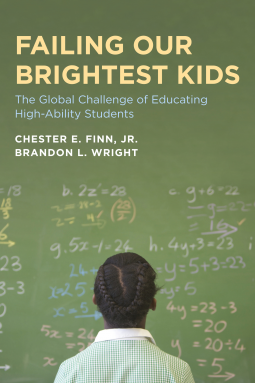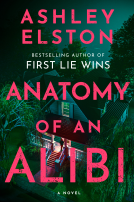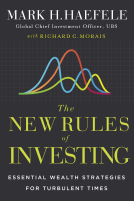
Failing Our Brightest Kids
by Chester E. Finn, Jr. and Brandon L. Wright
This title was previously available on NetGalley and is now archived.
Send NetGalley books directly to your Kindle or Kindle app
1
To read on a Kindle or Kindle app, please add kindle@netgalley.com as an approved email address to receive files in your Amazon account. Click here for step-by-step instructions.
2
Also find your Kindle email address within your Amazon account, and enter it here.
Pub Date Aug 28 2015 | Archive Date Sep 30 2015
Description
Advance Praise
Available Editions
| EDITION | Paperback |
| ISBN | 9781612508412 |
| PRICE | $32.00 (USD) |
Average rating from 6 members
Featured Reviews
 Jen M, Reviewer
Jen M, Reviewer
Failing Our Brightest Kids: The Global Challenge of Educating High-Ability Students
Book Description: In this provocative volume, Chester E. Finn, Jr., and Brandon L. Wright argue that, for decades, the United States has done too little to focus on educating students to achieve at high levels. The authors identify two core problems: First, compared to other countries, the United States does not produce enough high achievers. Second, students from disadvantaged backgrounds are severely underrepresented among those high achievers. The authors describe educating students to high levels of achievement as an issue of both equity and human capital: talented students deserve appropriate resources and attention, and the nation needs to develop these students’ abilities to remain competitive in the international arena.
American Education has focused on equity for several decades--on making sure that children who come from disadvantaged backgrounds reach a minimum level of proficiency. And there has been some success in closing that gap.
On the other hand, bright and high ability children are often neglected with the assumption that they will do fine anyway. The authors are concerned with those children for whom the minimum provides no challenge. How have these children been served? And how do our most capable students stand in relation with students from other countries?
In 2012, 27 of 34 countries did better than we did on the math section of the PISA (Programme for International Student Assessment) exam. (More information about the findings can be found here.) And this is just one assessment that reveals our less than stellar educational results compared to other countries.
While the authors make a strong case for better opportunities for all children with high ability or who are high achievers, they are even more concerned about the neglect of high ability students from disadvantaged homes in which academics are not a priority, students whose parents are unaware of what is offered or don't have the financial means to take advantage, students who live in areas where transportation to a better school is not available or practical, and of students who speak another language at home. Untapped and neglected potential that we cannot afford to waste. Why are other countries doing better at reaching these students than we are?
OK--I knew this was going to be a problem. How to review a book that has so much information and that I've highlighted perhaps over-zealously? (I had to keep switching highlight colors to bring out important details in important passages.) There is so much information to ponder!
In spite of the numerous acronyms for educational programs and assessments, the book is surprisingly readable. I enjoyed reading about the way the eleven countries in the study handled the problems of trying to provide both equity and excellence, their strengths and weaknesses, and what the U.S. might learn from their efforts.
To avoid bogging down in details that I find fascinating, I'm going to direct you to reviews that might give you a better idea about the importance of the book:
NPR review
Wall Street Journal review
NetGalley/Harvard Education Press
Education Theory. Aug. 28, 2015. Print length: 312 pages.
Readers who liked this book also liked:
Marie Bostwick
Historical Fiction, Literary Fiction, Women's Fiction
Halle Tecco
Business, Leadership, Finance, Health, Mind & Body, Nonfiction (Adult)
Rachel Joyce
Historical Fiction, Literary Fiction, Women's Fiction
James McBride
General Fiction (Adult), Historical Fiction, Literary Fiction
Mark Haefele; Richard C. Morais
Business, Leadership, Finance, Nonfiction (Adult)


















